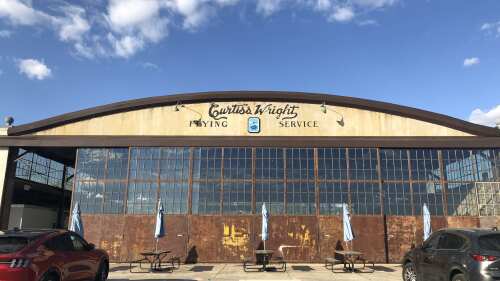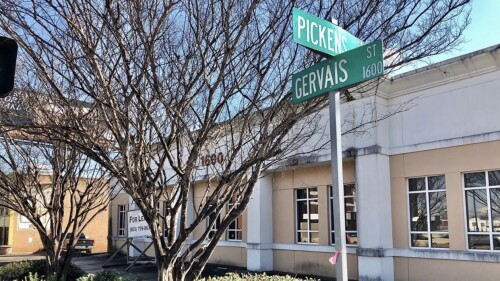Remember when we told you more than you probably wanted to know about recycling rules in the Midlands?
Reader Frances L. wanted to know more:
“You guys did a great post about recycling while back and I feel like we could use another. I recently have been seeing the City of Columbia post a couple of the Dirty Dozen (what shouldn’t be put in recycling) in the Free Times and I was surprised to see shredded paper. I have been putting it in my recycling in a brown paper grocery bag thinking I’m doing some of the work – it’s already shredded! I would greatly appreciate a post on the Dirty Dozen and why we’re not supposed to put them in recycling.”
We were intrigued, too, so we jumped back into the nitty-gritty of recycling and found the answers for her – and all of you. ⬇
A big thanks (again) for the info to our recycling go-to source, Sam Yager, the City of Columbia’s Assistant Superintendent of Public Works- Solid Waste. She’s the one always driving the recycling car around Cola. Read more of her expert advice on recycling here.

Richland County recycling car | image via Recycling Wizard
First, some numbers.
South Carolinians generated 4,308,161 tons of waste in 2016 – and of that, 1,094,569 tons (~25%) were recycled + 3,213,592 tons (~75%) were disposed of in landfills.
Of that 75% that went to landfills due to being tossed in trash cans, ~590,000 tons were recyclable materials (i.e. aluminum cans, cardboard, glass bottles + jars, office paper, plastic bottles and steel cans). Those 590,000 tons cost local governments $24+ million to dispose of and lost them $52 million in potential revenue.
Of the 25% that was set out to be recycled, ~110,393 tons were banned items – like appliances, electronics, batteries, used motor oil, whole waste tires, yard trimmings (banned in some landfills)... and your Drip coffee to-go cups.
So, what does all of this mean to you? Recycling is important. And knowing what can and can’t be recycled is even more important.
S.C.’s Dirty Dozen
Presenting: S.C.’s “Dirty Dozen”: the 12 items you should never place in your recycling bins or carts – and why.
1️⃣Plastic bags
Not only do they jam the machines at the recycling facilities, but they’re also a major contaminant to the environment (do reusable bags if you can). If the plastic bag has a #2 on it, you can recycle it at specific grocery stores.
2️⃣Plastic bags holding your approved recyclables
If you collect your recycling in a plastic bag – then transfer the bag to your bin – make sure to remove items from the plastic bag. Conveyor belt workers at the facilities have to remove the bags themselves, which wastes time and money.
3️⃣Shredded paper or other small items
Shredded paper and other small items usually fly out of the recycling truck and become litter before even making it to the facility. If it makes it there, it ends up falling through cracks of the sorting machines and contaminating other items. The golden rule here is: If it’s smaller than a Post-It note, just toss in the trash.
4️⃣Scrap metal
It can cause damage to the machines, so it’s safer to take it to a scrap metal dealer or a specific recycling center.
5️⃣Household chemicals
Hazardous household materials like paint, car fluids + household cleaners should be properly disposed of according to the instructions on their labels.
6️⃣Flattened bottles or cans
If you flatten your bottles and cans the machine will think they’re paper and sort it with paper – thus contaminating the paper. Bottom line: Do rinse, but don’t flatten these.
7️⃣Non-recyclable plastics
Check with your local recycling program to see which plastics are accepted.
8️⃣Caps/lids on glass bottles/jars
Lids on jars is a newer rule. Lids on glass jars are typically made of metal – and mixed materials are harder to separate. Glass goes through a glass crusher, and if the lid is still on it, it would mix metal into the glass. But as long as materials match, it’s fine to leave the lid on – like on soda bottles (plastic-on-plastic).
9️⃣Liquids or food
Always rinse recycling that previously had food or liquids in it. If something you recycle is too dirty, it’ll just end up in a landfill.
🔟Non-recyclable glass
No Pyrex baking dishes, glassware, light bulbs or mirrors in your bins. These types of glass are treated with chemicals and melt at a different temperature than glass bottles and jars.
1️⃣1️⃣Rope-like items
Water hoses, holidays lights + belts can wrap around machines and break them.
1️⃣2️⃣Diapers or bio-hazardous waste
Dirty diapers – and especially syringes + needles – are hazardous to recycling workers.
Side note: Some of the above items can still be recycled by taking them to the proper facility – but not recyclable via curbside pickup with your roll cart or bin.
Why are these products a no-go?
The Dirty Dozen (a campaign that started ~4-5 years ago) differs between states, cities + even counties. In S.C., a survey was taken from all the Materials Recovery Facilities (MRF) – or “MURFs” as Sam Y. called them – in which they were asked what they didn’t need any more of + how contamination could be lowered to determine what is and is not accepted in S.C.
Different “MURFs” take different things depending on who buys from them. Yes, you read that right; people buy your recycling. (An example: Patagonia buys recycled plastic to use in their clothing. More on that here.)
Yard clippings + leaves came up in our recycling conversation too. They do not require any bagging, so you can just put them in a pile on the curb (*not* in your garbage cans with house garbage or in your recycling bins + roll carts). They’re taken to a facility where, once a year, they’re ground + screened – and then sold.
Just like companies buy your recycling, residents + other people can buy back their yard clippings. Both Lexington and Richland counties sell ground-up yard debris as mulch.
I also asked Sam Y. the craziest things she’s ever seen recycled. Her answer: shotgun shells + an urn (with the ashes still in it). Creepy.
We love answering our readers’ questions, like this one about the Dirty Dozen from Frances L. Do you have a burning question you want us to answer? Comment below and tell us what’s on your mind. We’ll do our best to figure it out.
Give a hoot; don’t pollute,
–Sam











